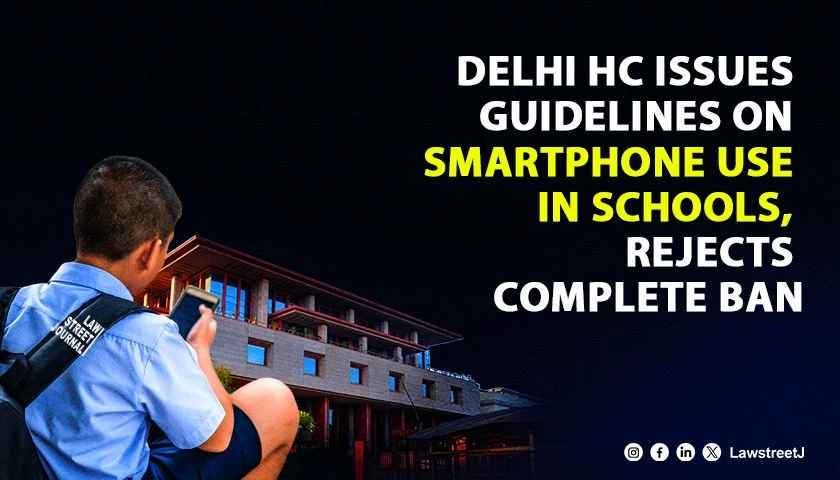New Delhi: The Delhi High Court has issued comprehensive guidelines to regulate smartphone use in schools, rejecting the idea of a complete ban as “both undesirable and unworkable” in today’s technology-driven educational environment.
Delhi High Court’s Smartphone Guidelines: Key Rules for Schools
Justice Anup Jairam Bhambhani delivered the order while addressing a petition arising from an incident involving a minor student who faced disciplinary action for misusing a smartphone at school.
During the proceedings, the Kendriya Vidyalaya Sangathan (KVS) specifically requested the court to formulate guidelines for smartphone use in schools, recognizing the need for balanced regulation.
Smartphone Use in Schools: Balanced Regulation Over Complete Ban
The court noted that existing circulars issued by the Central Board of Secondary Education (CBSE) and KVS in 2009, as well as a 2023 advisory from the Directorate of Education, had failed to achieve the desired results, primarily because they were based on the premise of a complete ban on smartphones.
“Without detracting from the deleterious and harmful effects that arise from the indiscriminate use and misuse of smartphones in schools, this court is of the view that smartphones also serve several salutary purposes, including as devices that help with coordination between parents and children, which adds to the safety and security of students attending school,” Justice Bhambhani observed.
The court outlined nine key guiding principles for schools to follow:
1. Students should not be barred from carrying smartphones to school, but their use must be regulated and monitored.
2. Where feasible, arrangements should be made for students to deposit smartphones upon arrival and retrieve them when leaving.
3. Smartphone use must not disrupt classroom teaching or discipline, with cameras and recording features prohibited in common areas and school vehicles.
4. Schools must educate students on responsible online behavior, digital etiquette, and the potential negative effects of excessive screen time.
5. Policies should permit smartphone use for safety and coordination purposes but prohibit entertainment or recreational use.
6. Regulations should be developed in consultation with parents, educators, and experts.
7. Schools should have discretion to implement policies suited to their specific circumstances.
8. Clear, fair, and enforceable consequences should be established for violations.
9. Policies should be regularly reviewed and updated to address emerging technological challenges.
The court directed that copies of the order be sent to the Chairman of CBSE, the Director of Education for Delhi, and the Commissioner of Kendriya Vidyalaya Sangathan.
The petition was disposed of with these guidelines, with the court also directing that the petitioner’s identity remain anonymized in public records.
Legal Representation:
• Advocates Ashu Bidhuri, Swapnam Prakash Singh, Hemant Baisla, Shabana Hussain, and Satyansh Gupta appeared for the minor student.
• Advocates S. Rajappa, R. Gowrishankar, and G. Dhivyasri represented Kendriya Vidyalaya.
• Advocates Anuj Tyagi and Akshita Agarwal appeared for the Delhi Commission for Protection of Child Rights.
Case Title: Y V vs. Kendriya Vidyalaya & Ors.



![Delhi High Court Sets Aside Arbitral Tribunal's Award Against NHAI in Highway Project Delay Case [Read Judgment]](/secure/uploads/2023/07/lj_9605_23374c2e-392c-4491-a2fe-f2f12fc5272f.jpg)
![Delhi Court Rejects Stay Request in Defamation Case Against Rajasthan CM Ashok Gehlot [Read Order]](/secure/uploads/2023/08/lj_5208_80de1ddc-d76a-4f7f-b180-408e3ae14fb4.jpg)







